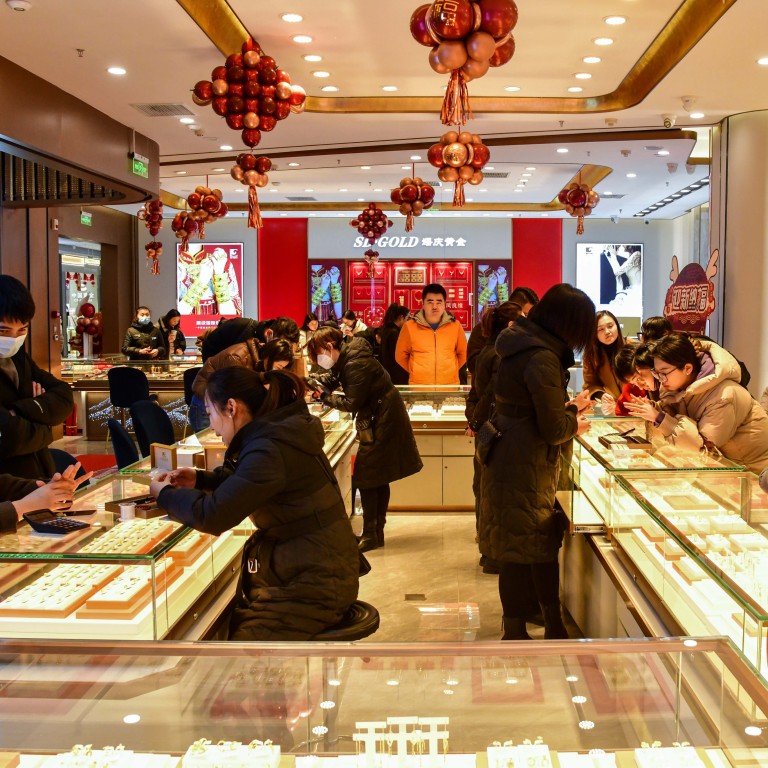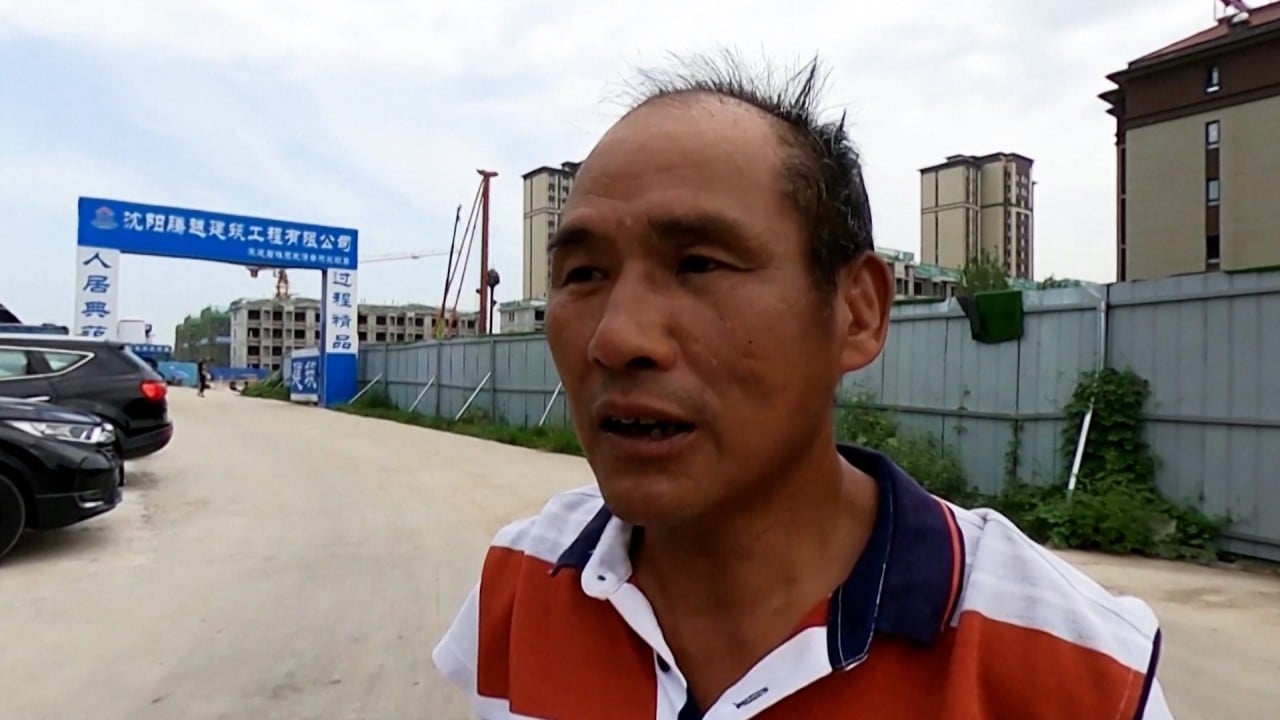
As Chinese scramble to save money, ‘everyone realises winter has come’, and they’re trying to get out of the cold
- Gone are the days when the property and stock markets yielded guaranteed gains in China, leading to middle-class investors becoming more risk-averse with wealth
- The search for moneymaking investments has prompted a global-trend-bucking gold rush in China, and banks say low-yield, low-risk term deposits are on the rise
After carefully reviewing the interest rates that several banks were offering for lump-sum term deposits, Li Yuan put 200,000 yuan (US$27,800) in a small local institution, ensuring that her hard-earned savings would see an annual return of 3.2 per cent for three years.
This marked the second year she has done so. And her carefully weighed investment decisions are being made as traditional means of investment in China have largely fallen by the wayside on the nation’s road to a stable economic recovery in uncertain times.
“I started planning to save for my son last year,” said the mother of a toddler in the northern province of Hebei. “There’s no big reward in bank deposits, but at least they’re predictable.
“The real estate market is bad, and so is the stock market. Even wealth-management products can’t guarantee a positive return.”
Li, who owns a small business and considers herself fortunate that it survived the pandemic, is among the millions of members of China’s middle class who have been left scratching their heads as they search for moneymaking investments that don’t come with outsized risk.
Free time worth more than money: China’s youth ‘lie flat’ as economy slows
The housing and stock markets – two of the most common means in which Chinese people built up their wealth in the past – no longer offer the same level of security.
In their absence, lower-risk tools – including large-denomination certificates of deposit (CDs), gold and universal life-insurance policies – are gaining popularity as a means of preserving familial wealth, according to wealth managers and researchers.
China’s benchmark CSI 300 index, which tracks 300 of the biggest companies on the Shanghai and Shenzhen bourses, has slumped by 38 per cent since January 2021, hitting a five-year low last week.
In the property sector, home prices in 70 large and medium-sized cities fell in December at the fastest pace in almost nine years, according to most recent data from the National Bureau of Statistics.
By area, the total amount of property sold across China last year slid by 8.5 per cent from 2022, while sales revenue fell by 6.5 per cent, year on year, according to the official figures.
Evelyn Xu, a wealth manager at a branch of the Bank of Jiangsu in Hangzhou, Zhejiang province, said that despite several rounds of interest rate cuts by the central bank in the past year, clients are showing particular interest in CDs while turning more conservative.
“Many clients have withdrawn from private banking products and embraced three-year CDs,” she said. “And for those who are investing in wealth-management products, their expectation now is ‘make sure there’s no loss’, instead of being picky about the annualised rate of return in the past which could have been over 5 per cent.”
Last summer, there were even people who travelled from other cities and provinces to purchase three-year CDs at her bank when it was offering a 3.3 per cent rate, she said.
While Chinese have a traditional preference for saving, new deposits in the country’s household sector have been rapidly growing since 2022, significantly surpassing the trend levels of the past decade, according to data from the central bank.
In 2022, new household deposits totalled 17.9 trillion yuan (US$2.5 trillion) – an increase of 8 trillion yuan from 2021. Last year, they remained high at 16.67 trillion yuan.
China’s world-leading gold rush shows how other investments have lost shine
Meanwhile, Chinese households are increasingly rushing toward gold as they seek safety in the precious metal.
China overtook India to be the top contributor to the world’s gold consumption last year, according to a report from the World Gold Council late last month.
China’s investment in gold bars and coins grew 28 per cent to 280 tonnes in 2023, and in the global gold jewellery market, China saw an increase of 10 per cent in demand for the year, it said.
With both individuals and the government purchasing more of the commodity, the country bucked a global trend of falling demand, it found.
“Gold has remained popular in the past year and been bought mainly as a safe-haven asset,” Xu said. “Prices have surged, but we expect they will hit new highs in 2024.”
At a branch of China Construction Bank Corporation in Hangzhou, an investor made a one-time purchase of 3kg of gold bars last month, the Qianjiang Evening News quoted a staff worker as saying.
Sue Mai, a senior manager at a foreign firm in Shanghai, said she put most of her family’s savings into a second home in suburban Shanghai in 2020 and in wealth-management products and mutual funds in the following years.
“When I first tried wealth-management products, they all brought yields, but later they couldn’t guarantee that. So, I turned to mutual funds, only to find them a nightmare,” she said, estimating an average loss of 40 per cent so far.
“I haven’t bothered to check the market value of that suburban home, but I guess it has also dropped below our purchasing price,” she said. “Now I’d rather keep my money at hand.”
China’s financial regulator pledges steps to shore up property market
For affluent families rising from entrepreneurship in the Yangtze River Delta over the past decades, large life insurance policies and trust funds are the two most popular options to protect their wealth, said Jin Xin, who specialises in family-wealth management at the College of Wealth Management under the Ningbo University of Finance and Economics.
“Business founders are mostly pessimistic about China’s growth prospect as well as the capability of their children – their assumed successors – so they need to have long-term plans,” he said.
“Jumbo insurance policies, for one thing, are a good store of value, and for another, can be used as collateral to secure a loan,” he said, adding that many others are also transferring their wealth to trusts operated outside mainland China, especially in Hong Kong.
As investors get more cautious, growth in the residential-sector leverage ratio in the country has remained sluggish since 2020 after a robust increase in the previous decade, according to a report last month by the National Institution for Finance and Development.
After a pickup in the first three quarters in 2023, it dropped by 0.6 percentage points from the third quarter to the fourth quarter, to 63.5 per cent, it found.
Everyone realises winter has come, and they’re becoming more conservative, having a better sense of risk
“As income-growth expectations weaken, households have proactively reduced liabilities, increased the proportion of deposits in assets, and cut the proportion of risky assets in their assets,” the report said.
Wu Fei, a professor with the Shanghai Advanced Institute of Finance under Shanghai Jiao Tong University, noted that investors got used to big rewards amid China’s rapid economic growth in the past decades, but that is no longer the case.
“Everyone realises winter has come, and they’re becoming more conservative, having a better sense of risk, especially when it comes to the property market and stock market,” Wu said.
“It’s like you were wearing little in a warm room, then you go outside, and you feel very cold.”
Unlike in the past, when people could make money wherever they invested, they now need to broaden their horizons, have patience and do more independent thinking, he suggested.


